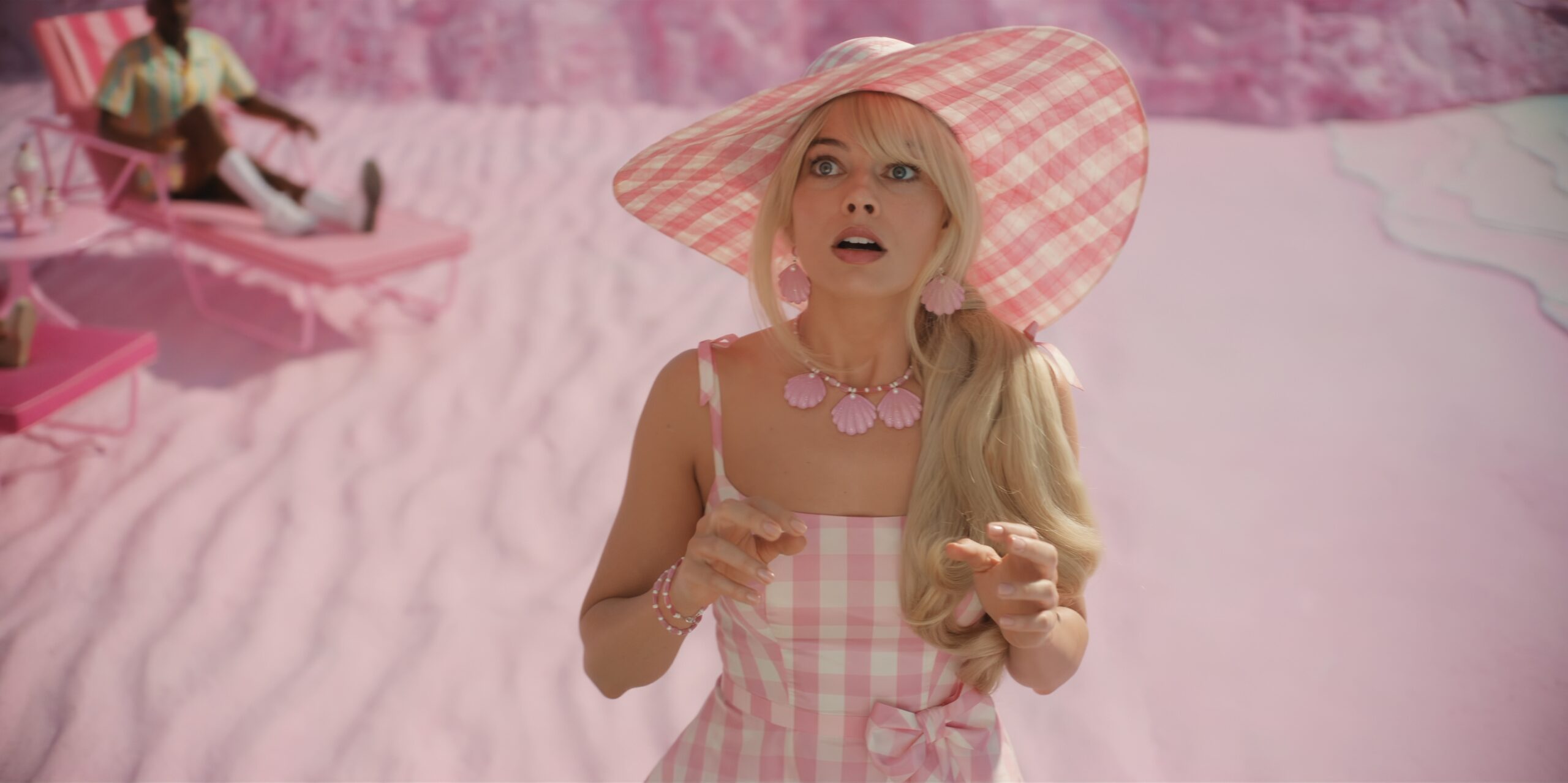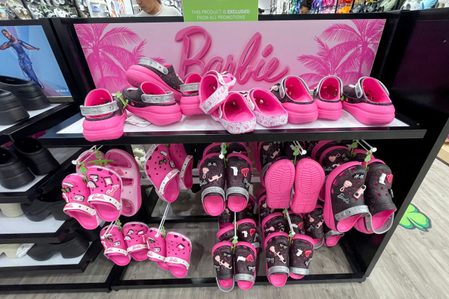SUMMARY
This is AI generated summarization, which may have errors. For context, always refer to the full article.

This review contains spoilers!
Barbie has a perfect day every day. She wakes up with a smile in her beautiful open-concept dreamhouse. Says hi to her neighbors. Showers without wasting water. Opens her closet and finds her clothes and makeup automatically and beautifully applied. Has a breakfast waffle and a side of butter perfectly land on her plate. Floats down to her pink Corvette (if she doesn’t use her bright pink slide). Drives around without wasting gas or even touching the steering wheel. Spends her days on the beach faux-sun bathing and her nights hosting disco-themed parties. Her attention is constantly being fought over by a flurry of Kens, prototypical himbos, all of whom are lucky enough if Barbie, any of the hundreds of them, pays any attention to them.
Barbie’s days are so perfect that when she voices out thoughts of death, it disrupts the fabric of reality. The music stops. Other Barbies and Kens freeze. Everyone stares at her. She smiles in disbelief at her own words. The scene feels like it’s from Invasions of the Body Snatchers. You’re waiting for Donald Sutherland to scream somewhere. Only when she pivots into small talk do things go back to normal. Or at least, next to normal. In Barbieland, there is no space for anything that isn’t perfect.
Greta Gerwig has made a career exploring the inner lives of young girls as they transition into womanhood. But unlike Christine McPherson or Jo March, Stereotypical Barbie (Margot Robbie) is uninterested in the world out there and is surprisingly passive. When given a choice between the way things were (a Manolo Blahnik) or a chance to go into the Real World (hilariously, a Birkenstock), she picks the former. But the threat of cellulite terrifies her enough to go out of her literal comfort zone, with Beach Ken (Ryan Gosling, at his campiest, dumbest, and hottest) in tow, to look for the human she is tethered to and who is responsible for these dysfunctions. What she finds, however, is a world and life more complicated than what she’s known.
Gerwig’s prior solo directorial efforts — Lady Bird (2017) and Little Women (2019) — are coming-of-age stories that double as period pieces, illustrating the social and material conditions that shape young womanhood in America in the early 2000s and in the late 1800s, respectively. In Barbie, Gerwig constructs yet another world in Barbieland — collaborating with production designer Sarah Greenwood, set decorator Katie Spencer, and costume designer Jacqueline Durran to create a pastel-colored utopian society where women run everything from garbage disposal to the Supreme Court. Soundstages are used to create spaces reminiscent of the imaginary landscapes and Mattel dreamhouses, while also paying homage to old Hollywood films such as The Wizard of Oz (1939), French comedies like Jacques Tati’s Playtime (1967), and contemporary meta-narratives like Peter Weir’s The Truman Show (2000).
Gerwig puts so much care into constructing these worlds that the Real World pales in comparison and unfortunately for Barbie, its second and third acts are in conversation with this realm. On Venice Beach, Barbie is immediately ogled, catcalled, and sexually harassed by strangers, with her retaliations landing her and Ken briefly in jail. In the Real World, Stereotypical Barbie learns she is considered a “fascist” by the young teens she hoped to inspire and discovers that the corporation that created their matriarchal haven is now run by chauvinist and capitalist pigs in black suits including the CEO (Will Ferrell). Meanwhile, Ken is invigorated by the “patriarchy” and, hurt by Barbie’s apathy towards him, decides to bring these teachings back to Barbieland to create a place where he and other Kens can finally matter.
It must be said that Barbie is a feat of commercial filmmaking and product integration. With a humorous resemblance to Jay Roach and Mike Myer’s Austin Powers franchise, Gerwig uses pastiche and artifice to reveal the messiness of humanity through the toys we create and the ideologies we strive to be represented. Referencing the opening sequence of Stanley Kubrick’s 2001: A Space Odyssey, the prologue narrates how, up until the arrival of Barbie as a fashion doll, little girls in America only had baby dolls to play with, highlighting how even at a young age they are taught to aspire towards motherhood. With the arrival of Barbie and her friends, little girls were encouraged to join the workforce and aspire to be “more” and Mattel gave girls a slice of a new version of the American dream: the freedom to become anything they want to be and to do it with style.
Barbie’s existence challenged the dominant paradigm of American womanhood while also unknowingly replacing it with something far more insidious over time and Barbie — both as a film and as a character within the film — buckles under the weight of Mattel’s 64-year legacy. Gerwig and co-writer Noah Baumbach poke fun at Mattel’s failures within the Barbie universe through the array of discontinued dolls like Midge (“Barbie’s pregnant friend”) and Allan (“He’s just Allan”); a way of capitalizing on the company’s troubled past. But Barbie is still a corporate product, part of a long line of recent “brand movies” that have attempted to humanize their creators and creations in the hopes of boosting sales. “An ordinary Barbie,” the Mattel employee Gloria (America Ferrera) proposes after helping save Barbieland, to which the Mattel CEO disapproves, only to reapprove a second later when he is informed of its financial rewards.
The way it introduces many of its narrative tangles feels too messy and the ways it resolves them is often too simplistic, at times insultingly so. Barbie is at its best when it uses its dark humor and silliness as a Trojan horse for patriarchal deprogramming, ideological inquiry, or as a method for exposing the depths of misogyny and capitalism. When an ad for a depressed Barbie suddenly flashes onscreen or when a voiceover interrupts Margot Robbie’s self-deprecation, raucous laughter ripples throughout the cinema. While its attempts at answering many of these questions are flawed and, at times, unfunny, the sheer ambition of tackling these questions in a commercial film is admirable.
Barbie has always been an aspirational figure, an exemption, rarely representative of the actual women the girls who play with her end up being. Mattel uses self-awareness to proclaim that it is in on the joke while also making sure they get our money. For all its fun, Barbie, at times, feels more fascinating as an intellectual exercise and a meta-textual commentary on the trappings of modern feminism than a commercial comedy film. Its attempts at humor at times register as didactic to the point of triteness, pandering to the morality of neoliberal audiences as a not-so-covert way to rehabilitate Mattel’s relationship with its consumers. Zenzelé Soa-Clark of Cinemóvil NYC wrote about the “brand movie” and the ways that “imaginative space for young viewers and hopeful artists is narrowed by the merchandise they can nag their parents to buy.” Maybe it is this hyperconsumerism or the marketing mega-machinery that leaves a bitter aftertaste and not the film itself.
Before the release of Barbie, one can’t help but remember the more problematic yet surprisingly affecting 2000 fantasy-comedy TV film Life-Size by Mark Rosman. Starring Lindsay Lohan and Tyra Banks, the film centers around a Black fashion doll Eve (Banks) who is accidentally brought to life by a grieving child in the hopes of reconnecting with her mother. Whereas Life-Size explores how difficult it is for young girls to grow up without female figures in their lives, Barbie asks the corollary: What happens when a beloved female figure is no longer representative or aspirational? How does she wrestle with those contradictions? What and who does she become?
The sheer scale of Barbie, at times, prevents it from emotionally landing and while its glorious set pieces, Singing in the Rain-style dance breaks, and beach wars between hot (!!!) men ensure the audience gets a bang for their buck, one wishes there was more time to breathe and let scenes sink in. Barbie’s most affecting moments are in the in-betweens; when it shines a spotlight on a relationship between the daughter and mother pairs that form the narrative center. Gerwig purposefully parallels the failing relationship between Sasha and her mother Gloria and Barbie’s attempts to connect to her creator Ruth Handler (Rhea Perlman), in an attempt to reconcile the unrealistic expectations placed upon us.
Only in its final moments, when the threat of death precipitates into an acceptance of humanity and otherness, do the absurdities of Barbie fall away and reveal a core similar to another profound tale — Margery William’s 1922 children’s classic The Velveteen Rabbit. At first, Stereotypical Barbie rejects everything that makes her imperfect, treating sadness and cellulite as mere malfunction. But by the end, she grows to appreciate the ordinary. She trades away perfection for contradiction and complexity. She gives up being an idea, a muse, a thing to aspire towards. She has transformed before she even noticed herself transforming. She becomes real. It is a conclusion more profound in hindsight, but one that still leaves one in wreckage and tears. – Rappler.com
‘Barbie’ was released in Philippine theaters on July 19, 2023 and is still in select cinemas.
Add a comment
How does this make you feel?

There are no comments yet. Add your comment to start the conversation.